I just got back from the Women’s March in Los Angeles, where 750,000 people overwhelmed the streets downtown to display their unfiltered, escalating outrage over our new administration. I have to say the protest sign work was top notch — that’s what happens when you get some of your country’s most creative people royally pissed off and then give them art supplies — but looking around, I saw something else too. I saw the resistance. And I saw a ton of disabled folks out there playing our part in it.
We’ve all been wracking our brains since November (or even earlier) about what we can do, what we should have done, or where to go from here. There’s lots of talk about running for office to turn back the tide of malignant, bigoted conservatism that’s made its way to the top of the food chain despite a three-million-ballot margin to the contrary. I’ve certainly wrestled with whether I should go back to my hometown and gay up the school board, and even signed up for the She Should Run Incubator to find out. I can’t say I’m positive that politics is in my future, let alone my present — but I certainly wouldn’t be the first disabled woman to say enough is enough.
When I put together the first installment of this list, I think I still hoped, somehow, that Trump would flame out and we wouldn’t see his inauguration after all. But we’re here now — it’s really happening, and it’s really time to build your team of resistance heroes and follow their example to the ends of the earth. So in honor of all the other crips I saw in the streets today, of every disabled woman who’s had it with lip service and wants to make sure this movement belongs to all of us, here are ten more who are already preparing the way.
Day Al-Mohamed
“When people use the term ‘activist,’ most people, myself included in that, tend to think of it as the protesters, the marches, the very loud people. And I think it’s been very hard for the general public, or even just your general audience, to know that there are a lot of ways that you can advocate.”
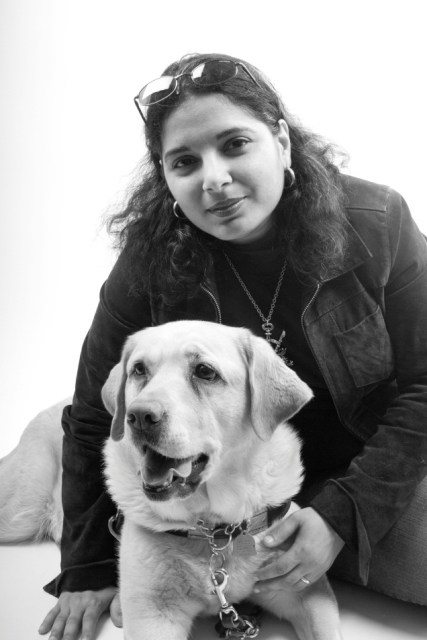
A strong candidate for Coolest Person Who Ever Lived, Day Al-Mohamed is a bisexual Arab-American woman who’s essentially done it all in disability advocacy. She worked her way from a Missouri state legislator’s office to lobbying for the American Council for the Blind, made a stop at the American Psychological Association, and wound up at the Department of Labor — first in the Office of Disability Employment Policy and now in the Occupational Safety and Health Administration. If that all sounds dry to you, you’re wrong: Al-Mohamed worked on the Affordable Care Act and the Employment Non-Discrimination Act, which she fought to make trans-inclusive. Best of all, her OSHA post is a career gig, so she’s in there fighting the good fight even with the change in administration.
I’m not sure how she finds the time given that her day job is “saving our country from itself,” but Al-Mohamed is also a prolific writer and filmmaker. She runs the disability policy blog/podcast Day in Washington; co-edited the ficton/poetry anthology Trust and Treachery: Tales of Power and Intrigue; has written short stories, poetry, comics, and the young adult novel Baba Ali and the Clockwork Djinn: A Steampunk Faerie Tale; and is in pre-production on a documentary about the Civil War’s Invalid Corps (one of my favorite pieces of overlooked history). She lives in D.C. with her wife, which is a small detail that makes me extremely happy.
Jane Campbell and Tanni Grey-Thompson
“This journey has been tough, but so rewarding. And each year I realize the potential of an independent crossbencher, which stokes my fire. My greatest hope is that I make a difference and, importantly, pave the way for our disabled brothers and sisters in the future.”
“I remember trying to go to the cinema with my friends, so I must have been nine or ten, and being told I could not go in because I did not have an adult with me, and they said ‘We don’t want people like you in because you are a fire risk’… we all went back and they tried to send me out again and [I said] ‘No, you can’t send me out because I am not a fire risk. I have never spontaneously combusted.’”
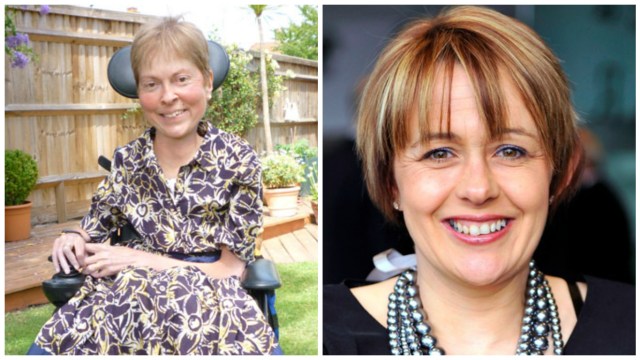
As members of England’s House of Lords, Jane Campbell and Tanni Grey-Thompson are, I kid you not, actual Baronesses — Baroness Campbell of Surbiton and Baroness Grey-Thompson of Eaglescliffe. Campbell attended segregated schools for disabled children for much of her early life, and went on to complete her dissertation on British suffragette campaigner Sylvia Pankhurst at the University of Sussex. She founded the National Center for Independent Living, chaired the British Council for Disabled People, and became a Dame Commander of the Order of the British Empire in 2003. She sits on the Parliamentary Joint Committee for Human Rights and pushed key social care and independent living provisions into a recent Government’s Care Bill. When the House of Lords approved her request for an assistant to facilitate her full participation, it was the first time an outsider had been allowed into the chambers since 1707. This woman shakes up traditions dating back three hundred years.
Grey-Thompson is Britain’s most decorated Paralympian — a former wheelchair racer who’s won 16 Paralympic medals (!), held over 30 world records, and won the London Marathon six times. She sat on the National Disability Council (along with numerous other boards and panels) over the course of her athletic career before transitioning to a career in television presenting, and was appointed to the House of Lords in 2010. She’s currently the Chancellor of the University of Northumbria at Newcastle and has over 20 honorary doctorates.
You can hear Baroness Campbell on every recovering music major’s favorite BBC radio program, Desert Island Discs, at the Radio 4 website and read an interview with Baroness Grey-Thompson at The Guardian.
Rebecca Cokley
“I was never without a disability identity; it was always something that was looked at with pride and honor in our family.”
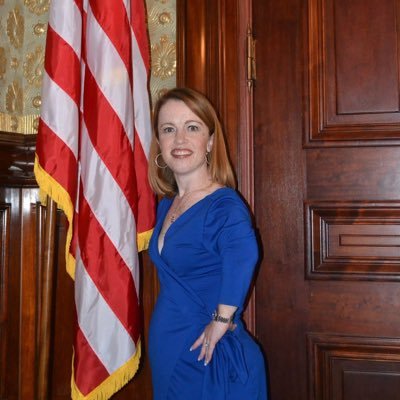
Rebecca Cokley is Executive Director of the National Council on Disability, an independent agency that works with the federal government to ensure disabled folks’ equal access to civic, social, and economic participation. The NCD’s role includes advising the President and Congress on disability policy, which will be (to put it mildly) an uphill battle these next four years, but there’s no one I’d trust to handle it more.
She served in various corners of the Obama administration before coming to the NCD, including the Department of Health and Human Services, the Office of Special Education and Rehabilitative Services (I would pay good money to watch her meet with Betsy DeVos), and the White House Presidential Personnel Office, where she made diverse hiring — including of queer people, disabled people, and people of color — a top priority. Cokley was also part of the Disability Caucus for the D.C. Women’s March and presented at the Disability Intersectionality Summit back in November. She’s a second-generation disability advocate, tireless big-picture thinker, and someone I’m frankly glad is on our side because I’d be terrified to go up against her in any capacity.
The NCD’s website includes disability rights progress reports dating back to before the Americans with Disabilities Act, so study up to help keep every accomplishment on there from vanishing between now and 2020.
Gabrielle Giffords
“In the absence of a Congress ready to act to reduce gun violence, we will keep working to create a different Congress.”
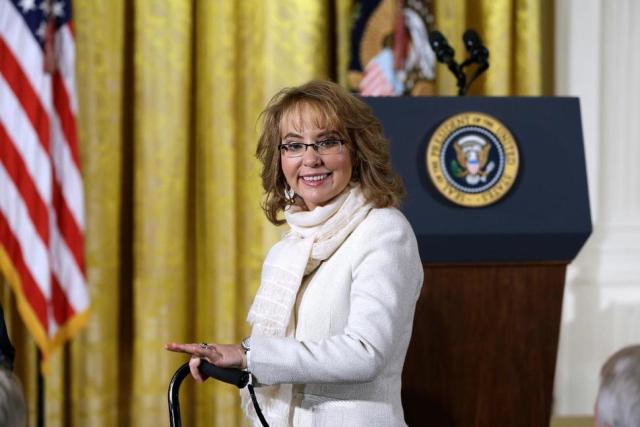
You probably know that Gabby Giffords survived an assassination attempt in 2011. You might also know that she served in the Arizona House of Representatives and Arizona State Senate prior to winning her seat in Congress, where she represented the 8th Congressional District. You may even know that she was the third woman ever elected to Congress from Arizona, the first Jewish congresswoman from that state, and has a Navy combat ship named after her. But what about her record in the House and her work since? If you don’t know about that, you should — because she’s someone to watch as the alt-right literally arms itself for battle.
During her time in office, Giffords focused on solar energy, immigration reform, and raising the minimum wage, and was a member of the House LGBT Equality Caucus. She retired from Congress in 2012 to focus on recovering, and her final bill passed unanimously.
Now she runs the PAC Americans for Responsible Solutions, which works to both prevent gun violence and protect responsible gun ownership through expanded background checks, keeping guns out of the hands of domestic abusers, stopping gun trafficking, and addressing gun violence as a public health issue. She’s going toe-to-toe with the NRA to ensure that “legislators will no longer have reason to fear the gun lobby and their dangerously deep pockets.”
Wilma Newhoudt-Druchen
“My work only makes me more aware that there is so much work to be done in the Deaf community. I am emotional about disability issues because I’m there to articulate personally what being disabled is all about.”
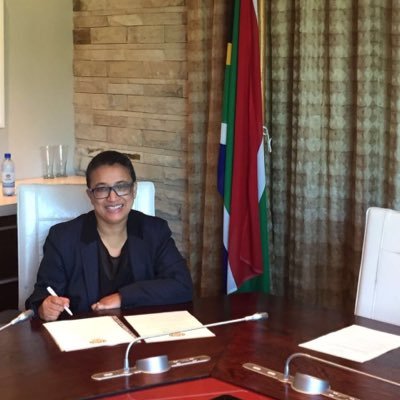
Wilma Newhoudt-Druchen became the first deaf member of South Africa’s Parliament in 1999 and has returned to politics for a fourth Parliamentary term after her reelection last year. (Here’s a video of her swearing in.) In the interim, she was the first woman and the first person from Africa to serve as Vice President of the World Federation of the Deaf, no big deal. She gave the Commencement address at Gallaudet University — her alma mater and the only university in the world explicitly designed for deaf and hard-of-hearing students — in 2009 and now sits on its Board of Trustees. She’s a member of South Africa’s National Assembly (the lower house of Parliament) and her five-year term is up in 2021, which I mention specifically to remind you that she will be in office longer than Donald Trump, and therefore there is hope for us all.
Carla Qualtrough
“I’m convinced that we’re going to make history here.”
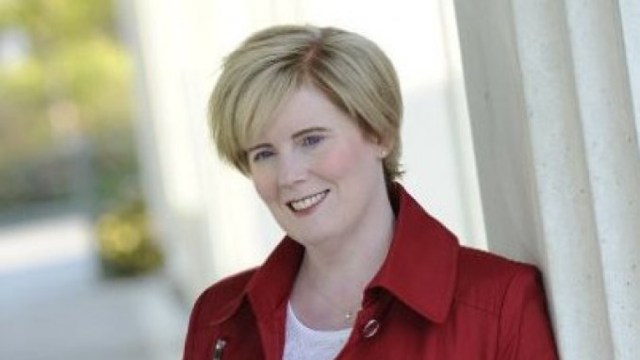
Carla Qualtrough is such a badass that Canadian Prime Minister Justin Trudeau created a new, expanded Cabinet position for her: Minister of Sport and Persons with Disabilities. And she’s more than qualified for that job as a civil rights lawyer who’s also won three Paralympic medals in swimming and served as Vice President of the Americas Paralympic Committee. While we’re busy considering an Education Secretary who doesn’t understand federal special education law, Qualtrough is her country’s first ever Cabinet Minister focused on disability issues.
Qualtrough is in the process of drafting a new piece of legislation that would be the first of its kind in Canada: the Canadians with Disabilities Act. She intends to use the Americans with Disabilities Act and Ontarians with Disabilities Act as models — unlike the U.S., Canada has signed and ratified the United Nations Convention on the Rights of Persons with Disabilities, but doesn’t yet have its own federal disability rights law in place. They must be doing something right up there, though, because two of British Columbia’s Cabinet Ministers (Stephanie Cadieux and Michelle Stilwell) are also disabled.
Victoria Rodríguez-Roldán
“We must use this time as a call to action… It is necessary for transgender community advocates to understand that mental health is a transgender issue, and to partner with the disability advocacy community in order to ensure that mental health policies empower people with mental illness to be in charge of their own lives.”
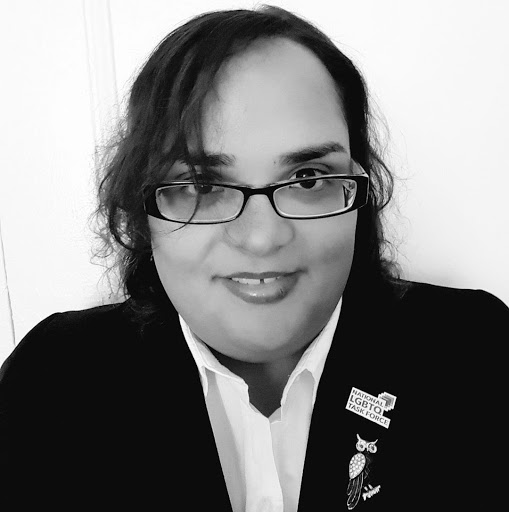
Victoria Rodríguez-Roldán directs the Trans and Gender Non-Conforming Justice Project for the National LGBTQ Task Force and puts the puts the connections between the trans and disabled communities front and center in all of her work. She was the first openly transgender member of student government at the University of Puerto Rico and pushed the administration for trans-inclusive student ID policies — which eventually led to a successful lobbying campaign around driver’s licenses and state IDs throughout Puerto Rico. She’s a member of the Disability Rights Bar Association and previously worked as an Equal Opportunity Specialist for the U.S. Department of Labor’s Civil Rights Center.
Her priorities include mental health services for trans people, ending anti-trans workplace discrimination, and approaching gun violence with a social justice lens. She’s written about trans experiences with healthcare and the prison system, which are both issues you likely need to brush up on ASAP, so why not get on it now. One hundred percent more productive than Trump Despair!
Kelly Vincent
“Usually seen sitting in a wheelchair; never seen sitting on a fence.”
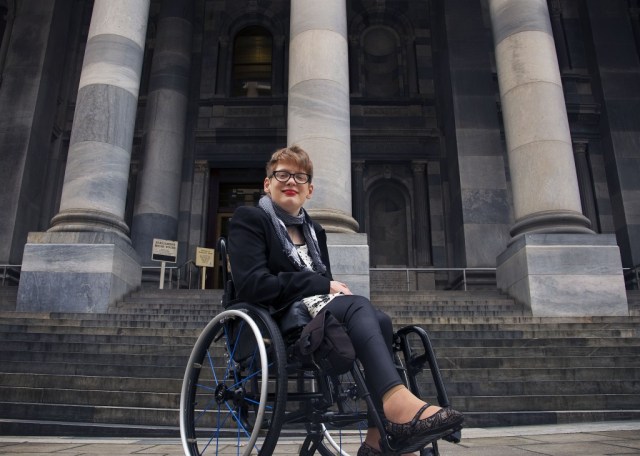
Kelly Vincent gets it done ahead of schedule. She’s the youngest member of the Parliament of South Australia; the youngest woman ever elected to an Australian Parliament, period; and her country’s first MP to run and win on a disability rights platform. She’s quite literally changed Parliament since her arrival seven years ago — Parliament House now features ramps and automated doors (which, no joke, it did not have before) and a height-adjustable, access-friendly desk. Having a Parliamentary desk designed to your personal specifications is my new favorite power move.
Vincent chairs the Access to the Education System for Students with Disabilities Committee and serves on a host of others, including the Joint Committee on Matters Relating to Elder Abuse. While in office she has advocated for greater access to medication for prisoners, an end to “growth attenuation therapy,” and an increased number of accessible restrooms — particularly “changing places” with full-size changing tables and non-slip floors — across Australia. She worked in theater prior to entering politics, so if you’re a creative type mulling an office run, you now know that there’s precedent and therefore no excuse not to try.
We are also the same age, which makes me feel great about my achievements in life.
Taryn Mackenzie Williams
“Equality of opportunity and full participation in community life will come from the efforts of those like all of you, who are willing to disrupt the complacency and the status quo of the systems and attitudes that enable a continued second-class status for people with disabilities.”
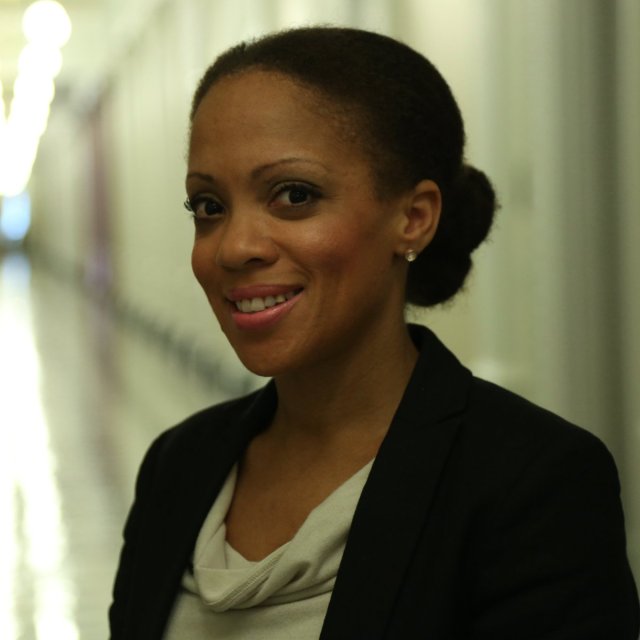
As Youth Policy Team Director at the Office of Disability Employment Policy, Taryn Mackenzie Williams provides young disabled people with resources for entering the workforce (check out this page on mental health and employment accommodations), including a Five Guideposts for Success plan based on high expectations, equal opportunity, self-determination, independent living, economic self-sufficiency, and individualized job transition planning — so essentially everything disabled people deserve, but no one expects us to have. ODEP advocates for disabled people’s workplace participation through policy and coordination with employers, which is crucial for a population that has only a 17.5 percent employment rate and roughly twice the unemployment rate of nondisabled people. I highly recommend making her priorities your own in all social justice plans.








Comments
Carrie, I love when you profile people getting all political. <3
Love this. How can I be a more involved memeber?What can I do in my community to get more awareness out. I live in Wilmington NC and want the disabled community to be seen, heard, and for things to change. Any websites, article suggestions, anything is appreciated.
Thank you, that is awesome to hear! I’d recommend any of the resources on this list: https://develop.autostraddle.com/crip-lit-an-intersectional-queer-crip-syllabus-333400/. Lots of books, blogs, etc.
The Disability Visibility Project is another great resource that’s got new stuff posted all the time, especially through their Facebook group (which you can find from their website): https://disabilityvisibilityproject.com/.
Today’s Google doodle is also about Ed Roberts and the disability rights movement, so if you click through on that you’ll get a lot of useful historical info.
LOVE THIS. Great to see an theatre person on the list and shout puts to Tanni and Jane. Can this be a semi-regular thing?
As long as there are disabled folks out there raising hell, I’ll do my best to bring them to Autostraddle!
This right ther: “Parliament House now features ramps and automated doors (which, no joke, it did not have before) and a height-adjustable, access-friendly desk. Having a Parliamentary desk designed to your personal specifications is my new favorite power move.”
Awesome.
I live in St. Louis, MO, and was wondering if anyone knew which Missouri legislator Day Al-Mohamed worked for.
I worked for Representative Bill Boucher of Kansas City.
Thanks so much for informing us about all these badass role models, Carrie!
Awesome article! I feel a little more hopeful about the world knowing that these badass women are out there doing their thing. (And holy shit do I love Gabby Giffords. That woman tells it like it is.)
I would like my story to be told and I am having a panic attack at the moment
My name is Kassi Pierre, I would like help with the difficulties that I am facing in the U.S. I have a lot of mental illnesses , I am disabled i have Major Depressive disorder, anxiety, Bipolar disorder, PTSD, OCD, Psychosis, and a possible new diagnosis being Shisco-affective I’ve been staying at hospital for months with treatments for the past few years, I feel like a prisoner. Afterwards I was raped, twice and i am constantly being street harassed and molested. I couldn’t leave the house or finish my university. It became a bigger problem when i try to commit suicide. People don’t want me to be gay and forcing me to be straight that’s why I was raped and I’m not allowed to meet other gay women. I am persecuted and I think the government is involved. The doctors and people I told don’t want to help me or just make my problems more serious. More information on my facebook page.
https://m.facebook.com/kassi.pierre.1?ref=bookmarks
Also my gofundme:
https://www.gofundme.com/mentally-ill-ptsd-ocd-psychosis